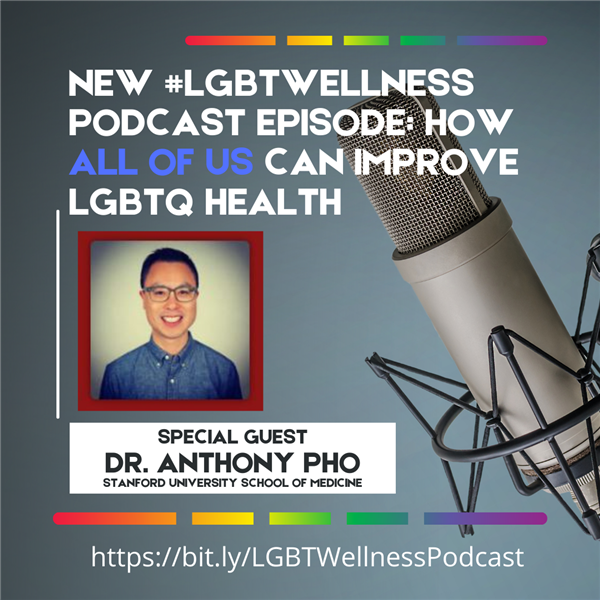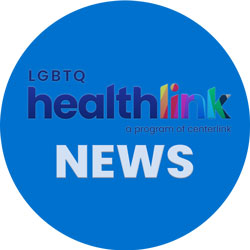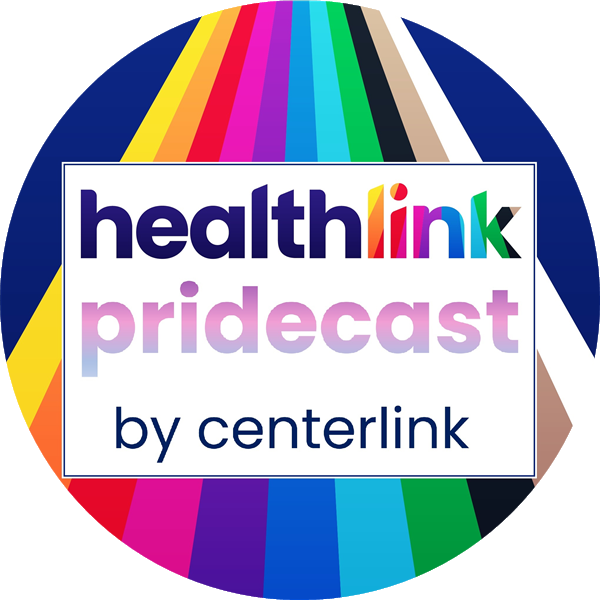How All of Us Can Improve LGBTQ Health – Special #LGBTWellness Podcast

LGBT HealthLink, 5/6/2022
LISTEN to our Weekly Wellness Roundup podcast! Subscribe here: https://bit.ly/LGBTWellnessPodcast or where ever you podcast.
This week’s roundup is all about the All of Us Research Program, a federal program aiming to gather health information on 1 million Americans so that we can better understand public health. The best part? All of Us has been working with Stanford University School of Medicine as their LGBTQ community partner to make sure we are counted. We sat down with Dr. Anthony Pho, a postdoctoral scholar with the PRIDE study and PRIDEnet at Stanford, to spill all the tea. You can listen to the full three-part interview on our podcast channel, or keep reading for the highlights.
Meet Anthony
Our very special guest, Dr. Anthony Pho, is a “queer researcher doing queer research,” and we are here for it. Anthony went to nursing school and works exclusively with LGBTQ patients. “I was very passionate about advocating for my patients through LGBTQ research,” given the limited information we still have on LGBTQ health, Anthony says. He is currently doing a post-doc with PRIDE Study and PRIDEnet, which is how he came to be involved with All of Us. Anthony chatted with us about all things LGBTQ health, but one particular topic of interest was how genomics (or the study of genes) was being used as part of All of Us to match what we know about environmental and genetic factors for health.
Recipe for Fabulousness
“If genes are the individual recipes or instructions,” Anthony explains, then genomics are “all of these fabulous recipes that go into the genome cookbook and make you, you.” Understanding genomics helps us to understand and detect disease. “If we can detect things early enough, then we can maximize a plan to improve a person’s health and possibly even cure disease.” This also fits into the idea of “precision medicine,” which means tailoring care as much as possible to the individual, which we can do if we understand their genome and what it means for their health. “Environmental factors such as what we eat, the air we breathe, what medicines we take all can influence our gene expression, and so it’s important to combine both types of information.”
We’re Here, We’re Queer…
Why is it important for LGBTQ people to participate in this type of research? Well, because for so long, we have not been included (or at least not identified) in public health research, meaning we have huge gaps in what we know about LGBTQ health – and how to improve it. “The ability to actually show up in health research studies” is part of health equity, Anthony says, because it begins the process of addressing disparities. “For the first time, the federal government is really, at an incredible scale, recognizing that LGBTQ people have been underrepresented in biomedical research.” That’s why they have made inclusion of LGBTQ people a priority in this initiative.
So, Where Is This Going?
Two CenterLink member centers, who are among the five working with All of Us to increase LGBTQ engagement, sent representatives to participate in the conversation. Evan Killingsworth from LGBT Detroit asked what some of the real-world applications of All of Us (and specifically its genomics component) might be for LGBTQ folks. Anthony provided examples such as using this data to inform guidelines for hormone therapy for transgender patients with more information on genetic risk for cancer, allowing clinicians to offer more and safer options to trans people seeking hormones and recommending screenings to assess potential cancer risks.
What About the Haters?
Kim Fountain from Center on Halsted asked if genetic testing could ever be used against LGBTQ people) and everyone else if protections healthcare access protections under the Affordable Care Act ever go away. Anthony says that while it’s not unreasonable to be concerned about the future, “I turn that concern into activism.” We can’t be forced to pick between advancing science and protecting our rights, so rather than hiding, we need to rise up and demand from our legislators that protections for those with prior medical conditions are here to stay.
Let’s Talk Numbers
“We’re doing phenomenal” on LGBTQ recruitment to date, according to Anthony. He attributes part of that success to the way in which All of Us allows people to identify their sexual orientation and gender identity in a highly inclusive and engaging way. To date, over 42,000 LGBTQ individuals have enrolled in the program, the largest for any national research study. LGBTQ folks comprise about 13% of the overall All of Us participants (above our share of the population) and 9% of those doing the whole genome sequencing component.
Want to Get Involved?
Anyone can sign up to be part of the initiative, share some info about their health, and contribute to what we know about LGBTQ health inequities (and how to end them). “We actually created a specific landing page for LGBTQ people” based on listening sessions with LGBT prospective participants, Anthony explains. “On that page you’re going to find more information that’s relevant specifically to our communities.” His final advice? “Read more, enroll, educate yourself, and advocate for this wonderful research program.”




